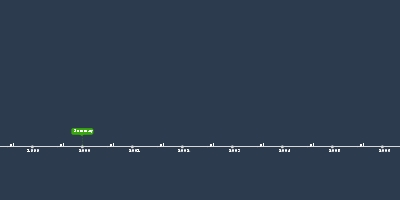Persian Gulf war (1 jan 1990 ano – 1 jan 1991 ano)
Descrição:
PErsian Gulf War:The 1991 war between Iraq and a U.S.-led international coalition that was sparked by the 1990 Iraqi invasion of Kuwait. A forty-day bombing campaign against Iraq followed by coalition troops storming into Kuwait brought a quick coalition victory.The end of the Cold War left the United States as the sole military superpower, at the head of what Bush called a “new world order,” with European and Asian allies in support. American officials and diplomats presumed that U.S. interests would prevail in this new environment, but they still faced an array of regional, religious, and ethnic conflicts that defied easy solutions. Nowhere was friction more pressing or more complex than in the Middle East — conflicts in the oil-rich lands stretching from Iran to Algeria would dominate U.S. foreign policy for the next two decades, replacing the Cold War at the center of American geopolitics.
After Carter’s success negotiating the 1979 Egypt-Israel treaty at Camp David, there had been few bright spots in U.S. Middle Eastern diplomacy. In 1982, the Reagan administration sent American troops to join a multinational peacekeeping force in Lebanon, where skirmishes between Palestine Liberation Organization (PLO) fighters and Israeli-backed Lebanese forces threatened to spark a regional war. But when Lebanese militants loyal to Iran, motivated by continuing American support for Israel, killed 241 American marines, Reagan abruptly withdrew the forces. Three years later, Palestinians living in the Gaza Strip and along the West Bank of the Jordan River — territories occupied by Israel since 1967 — mounted an “intifada,” a civilian uprising against Israeli authority. In response, American diplomats stepped up efforts to persuade the PLO and Arab nations to accept the legitimacy of Israel and to convince the Israelis to allow the creation of a Palestinian state. Neither initiative met with much success. Burdened in part by a history of support for undemocratic regimes in Middle Eastern countries, the United States was not viewed as an honest broker.
Persian Gulf War
American interest in a reliable supply of oil from the Persian Gulf region led the United States into a short but consequential war in the Persian Gulf in the early 1990s. Ten years earlier, in September 1980, Iraq, a secular state headed by the dictator Saddam Hussein, had attacked the revolutionary Shiite Islamic nation of Iran, headed by Ayatollah Khomeini. The fighting was intense and long lasting — an eight-year war of attrition that claimed a million casualties. Reagan supported Hussein with military intelligence and other aid, in order to maintain access to Iraqi oil, undermine Iran, and preserve a balance of power in the Middle East favorable to the United States. An armistice in 1988 ended the inconclusive war, with both sides still claiming the territory that sparked the conflict.
Two years later, in August 1990, Hussein went to war again. Believing (erroneously) that he still had the support of the United States, Hussein sent in troops and quickly conquered Kuwait, Iraq’s small, oil-rich neighbor, and threatened Saudi Arabia, the site of one-fifth of the world’s known oil reserves and an informal ally of the United States. The Iraqi leader had miscalculated badly. To preserve the administration’s preferred balance of power in the region, President George H. W. Bush sponsored a series of resolutions in the United Nations Security Council calling for Iraq to withdraw from Kuwait. When Hussein refused, Bush successfully prodded the UN to authorize the use of force, and the president organized a military coalition of thirty-four nations. Splitting mostly along party lines, the Republican-led House of Representatives authorized American participation by a vote of 250 to 183, and the Democratic-led Senate agreed by the close margin of 52 to 47.
The U.S.-led coalition forces quickly won the Persian Gulf War for the “liberation of Kuwait.” To avoid a protracted struggle and retain French and Russian support for the UN coalition, Bush decided against occupying Iraq and removing Saddam Hussein from power. Instead, he won passage of UN Resolution 687, which imposed economic sanctions against Iraq unless it allowed exhaustive weapons inspections, destroyed all biological and chemical arms, and unconditionally abandoned any nuclear programs. The quick victory, low incidence of American casualties, and tidy ending produced a euphoric reaction at home. “By God, we’ve kicked the Vietnam syndrome once and for all,” Bush announced, his approval spiking in the war’s aftermath. But Hussein remained a formidable power in the region, and in March 2003, he would become the pretext for Bush’s son, President George W. Bush, to initiate another war in Iraq — one that would be much more protracted, expensive, and bloody
A U.S. soldier with Norman Schwarzkopf, commander of coalition forces in the Persian Gulf War. Women comprised approximately 10 percent of American troops in that conflict. In the last decades of the twentieth century, women increasingly chose military careers and were more frequently assigned to combat zones.
For half a century, the United States and the Soviet Union sought to partition the world into rival economic and ideological blocs: capitalist against communist. The end of their Cold War, and increasing U.S. involvement in the Middle East, sowed the seeds of future conflicts. The most prominent of those struggles pitted a Western-centered agenda of economic and cultural globalization against an anti-Western agenda of Muslim and Arab regionalism. But other post–Cold War shifts loomed as well. The European Union emerged as a massive united trading bloc, economic engine, and global political force; and China saw spectacular economic growth that was only beginning to coalesce in the early 1990s. The post–Cold War world promised to be a multipolar one, with centers of power in Europe, the United States, and East Asia — and a constant conflict brewing in the Middle East.
Adicionado na linha do tempo:
Data:
1 jan 1990 ano
1 jan 1991 ano
~ 12 months
